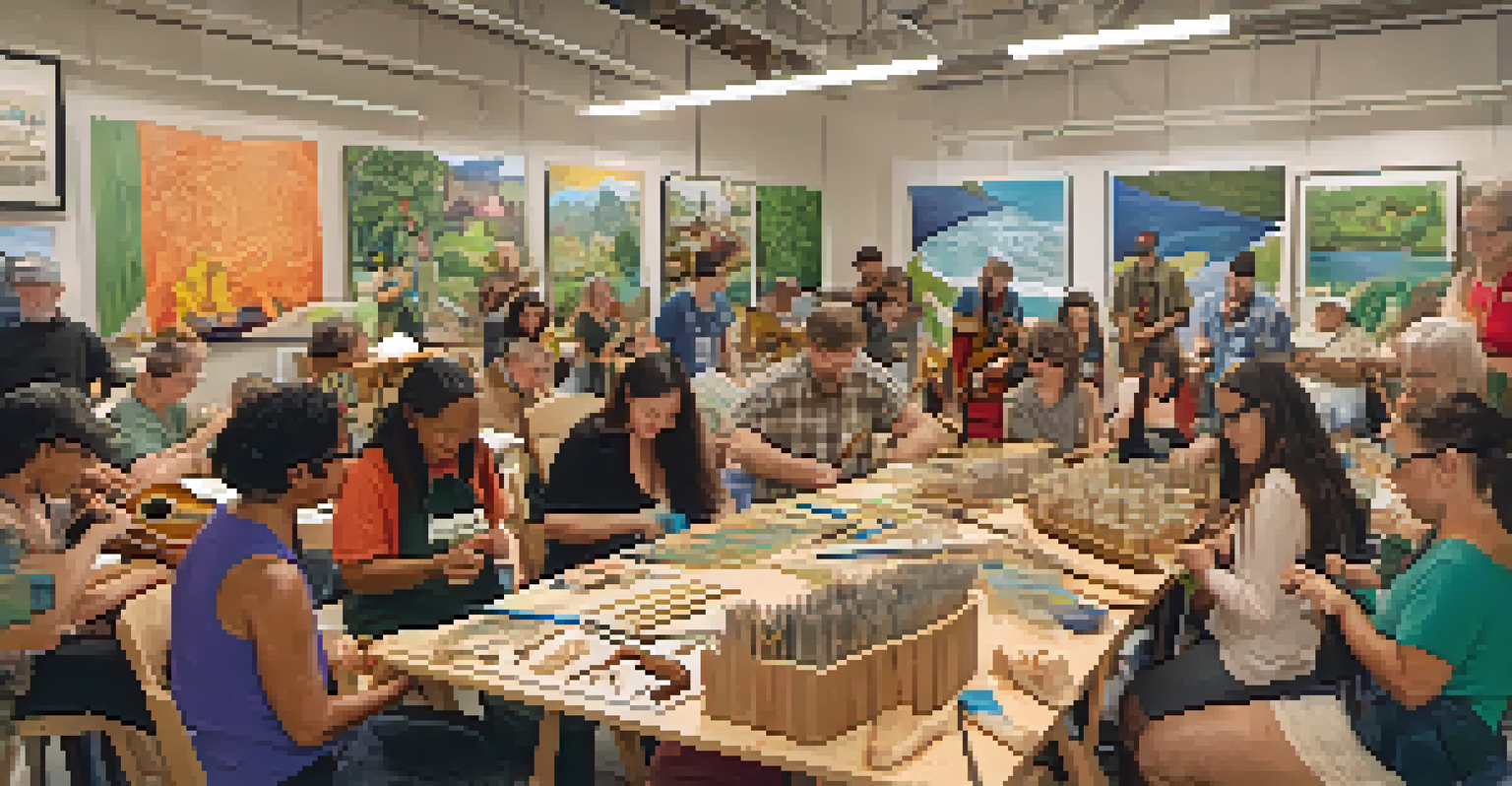Sustainable Practices in Ukulele Crafting: A New Trend

Understanding the Importance of Sustainability in Crafting
Sustainability in crafting is crucial as it minimizes environmental impact while promoting responsible resource use. In the world of ukulele crafting, this means using materials that are sourced ethically and are eco-friendly. As musicians and craftsmen become more aware of their carbon footprints, the shift towards sustainable practices is both a trend and a necessity.
The greatest threat to our planet is the belief that someone else will save it.
By focusing on sustainability, ukulele makers not only contribute to the health of our planet but also create instruments that resonate with the values of their consumers. People today want to know that their purchases support environmentally friendly practices. This growing awareness is reshaping the way instruments are made, from sourcing materials to crafting methods.
Ultimately, embracing sustainability in ukulele crafting is about creating a harmonious relationship between music and nature. As artisans adopt these practices, they not only improve their craft but also inspire others in the music community to follow suit, fostering a culture of environmental responsibility.
Materials Matter: Choosing Sustainable Resources
The choice of materials is a fundamental aspect of sustainable ukulele crafting. Traditional woods like mahogany and rosewood are often sourced from endangered forests, leading to overexploitation. However, many luthiers are now turning to alternative woods, such as bamboo or reclaimed timber, which offer beautiful sound qualities without the environmental toll.

Additionally, some artisans are experimenting with innovative materials like recycled plastics or composite materials. These alternatives not only reduce waste but can also produce unique sound characteristics that challenge the norms of traditional ukulele crafting. This creative approach highlights how sustainability can drive innovation in the music industry.
Sustainability Enhances Ukulele Crafting
Embracing sustainable practices in ukulele crafting not only minimizes environmental impact but also resonates with the values of modern consumers.
By promoting the use of sustainable materials, ukulele makers are setting an example for other craft industries. They demonstrate that high-quality instruments can be made without compromising the environment, encouraging a more conscious consumer base that values sustainability.
Eco-Friendly Manufacturing Techniques in Ukulele Crafting
The manufacturing process plays a significant role in the sustainability of ukuleles. Many craftsmen are adopting eco-friendly practices, such as using non-toxic finishes and adhesives that minimize harmful emissions. This shift not only ensures a safer workspace but also results in instruments that are healthier for musicians and the environment.
Sustainability is not just about doing less harm. It's about doing more good.
Moreover, some luthiers are implementing energy-efficient methods in their workshops, such as solar power or energy-saving tools. These changes reduce the overall energy consumption associated with crafting ukuleles, paving the way for a greener production process. This commitment to sustainability resonates with customers who appreciate transparency in how their instruments are made.
Incorporating eco-friendly techniques into ukulele crafting reflects a broader movement towards sustainability in all manufacturing sectors. As artisans embrace these practices, they contribute to creating a more sustainable future for both the music industry and the planet.
The Role of Local Sourcing in Sustainable Ukulele Crafting
Local sourcing is another key factor in sustainable ukulele crafting. By obtaining materials from local suppliers, luthiers reduce transportation emissions and support their communities. This practice not only fosters a sense of connection between the maker and the materials but also strengthens the local economy.
Furthermore, local sourcing often means that the materials are fresher and more adaptable to the regional climate, which can enhance the quality of the final product. For instance, using local woods can yield unique tonal properties that reflect the character of the area. This adds a personal touch to each instrument, making them more special to musicians.
Local Sourcing Strengthens Community
By sourcing materials locally, luthiers reduce carbon footprints while supporting their communities and enhancing the uniqueness of their instruments.
In a world where mass production often overshadows craftsmanship, local sourcing embodies the spirit of sustainability. It encourages a more thoughtful approach to crafting, reminding us that the journey of an instrument begins long before it reaches the hands of a musician.
Community Initiatives Supporting Sustainable Ukulele Crafting
Community initiatives play a vital role in promoting sustainable practices within ukulele crafting. Workshops and events focused on eco-friendly crafting help educate aspiring luthiers and music enthusiasts about the importance of sustainability. These gatherings foster a sense of community and collaboration, where knowledge is shared, and innovative ideas flourish.
Many organizations are also working to preserve traditional crafting techniques that align with sustainable practices. By connecting artisans with experienced craftsmen, these initiatives ensure that valuable skills are passed down while emphasizing the importance of environmental stewardship. This blend of tradition and innovation creates a rich tapestry of sustainable crafting.
Moreover, community-focused projects often involve partnerships with local environmental groups, reinforcing the connection between music and nature. As more people engage in sustainable ukulele crafting, they not only create beautiful instruments but also contribute to a larger movement towards ecological awareness and preservation.
Consumer Awareness and Demand for Sustainable Ukuleles
As the demand for sustainable products rises, consumers are becoming increasingly aware of their purchasing choices. Musicians are now looking for ukuleles that reflect their values, which includes a preference for those made with sustainable materials and practices. This heightened awareness is driving a shift in the market, encouraging more luthiers to adopt eco-friendly approaches.
Social media has played a significant role in amplifying the conversation around sustainable crafting. Musicians share their experiences and promote brands that prioritize sustainability, creating a ripple effect that influences others. This grassroots movement underscores the power of community in shaping consumer behavior and expectations.
Consumer Demand Drives Eco-Friendly Change
As musicians increasingly seek sustainable products, their preferences are pushing luthiers to adopt eco-friendly materials and practices.
Ultimately, the demand for sustainable ukuleles is not just a fleeting trend; it's a reflection of a broader societal shift towards environmental consciousness. As musicians advocate for change, they are not only supporting artisans who practice sustainability but also inspiring future generations to make responsible choices.
The Future of Sustainable Ukulele Crafting
Looking ahead, the future of sustainable ukulele crafting appears promising. With a growing emphasis on environmental responsibility, more artisans are likely to explore innovative materials and techniques. This evolution will not only enhance the quality of the instruments but also reinforce the idea that craftsmanship and sustainability can go hand in hand.
As sustainability becomes a core value in the crafting community, we can expect collaborations between artisans, environmental organizations, and musicians. These partnerships can lead to exciting new projects that push the boundaries of what sustainable crafting can achieve. The synergy between music and nature will continue to inspire creativity and innovation.

In conclusion, the trend of sustainable practices in ukulele crafting is a beautiful reminder of the harmony that can exist between art and environmental stewardship. By embracing these values, we pave the way for a future where music not only entertains but also nurtures the planet we all share.